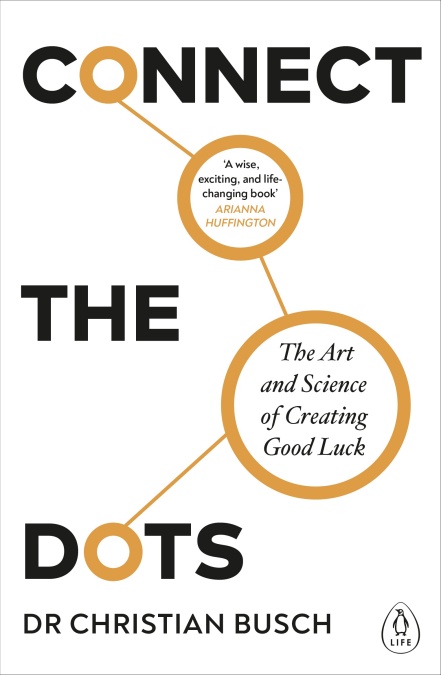What often results when we contribute to someone else’s well-being is a ‘helper’s high’. The endorphins released when doing something kind have a lot in common with those released during sex: for example, studies have shown that the ‘pleasure centers’ of the brain light up when people give – or think about giving – money to good causes.
By focusing on developing meaningful relationships and reflecting on one’s experiences, transformations can occur and we can ‘feel our way’ towards new opportunities and paths for meaning. It allows us to place some ‘low-cost bets’, and can set us up for serendipity. It’s not just random that people find unexpected opportunities through volunteering, or that people often find their next projects by serving on the board of non-profits. Defining what’s important to us provides a North Star that allows us to connect the dots. Often out of necessity.
Remember RLabs, the education organization in Cape Town’s impoverished Bridgetown district? Every year, the organization chooses a theme related to its culture. In 2020, it was ‘rise up’.
The year started out nicely for the organization: it had lined up new partnerships, and the year was all planned out. Then, in March, South Africa, along with much of the rest of the world, unexpectedly went into lockdown. Partners informed RLabs that they were not proceeding with their support. RLabs was close to not being able to meet its payroll. But more urgently, RLabs’ com- munity was suffering. RLabs, true to its mantra of ‘making hope contagious’, made a concerted effort to be intentional about how it could operate as a responsible corporate citizen.
Most organizations would have gone into fight-or-flight mode, cutting costs and focusing only on their own needs. Not RLabs. The organization decided to provide electricity and support for 500 community members whose energy supply had been cut off, and offered micro-grants to dozens of organizations that helped to feed people who had lost everything.
All of a sudden, UNICEF was interested in collaborating and leveraging RLabs’ technology platform. A major international bank, which had planned to engage 10,000 people as part of a CSR initiative and was looking for social organizations that did some- thing effective in response to Covid, unexpectedly came across RLabs. It invested over $400,000. Within a few weeks everything shifted, and opportunities started to spring up. The result was that 2020 turned into RLabs’ best ever year, and the organization doubled its income.
By having a compass and being true to their mission instead of falling into a simple fight-or-flight response, the team made serendipity possible. It allowed others to connect the dots for them.
Now with 250 people on the payroll, serendipity started to happen en masse. The team realized that it could turn its courses into nanocourses via WhatsApp – which received massive uptake. RLabs even sells it as a service to other companies now. What did Marlon Parker, RLabs’ founder, take from that journey? ‘Serendipity doesn’t flow from withdrawing – it flows from purpose and connection.’
Similarly, instead of shutting down, some distilleries started producing alcohol-based hand sanitizer at an affordable price. Some snow-cannon businesses produced disinfection cannons for large open spaces, and some musicians started giving online lessons. New opportunities and business models are emerging for those who are ready and not stuck in functional fixedness.
This was true for Özlem Türeci. When she co-founded BioN Tech, a German company, in 2008, little did she know that she would become a key player in the 2020 vaccine race, enabling millions of doses to be developed. Her company partnered with Pfizer to develop the first US-authorized Covid-19 vaccine. Together with her husband, she had spent more than a decade developing vaccines based on mRNA technology, an approach that takes advantage of the natural processes that cells use to translate underlying DNA blueprints into necessary proteins. Their aim was to battle cancer, and they had learned how mRNA could be manipulated to affect the immune system. When Covid-19 happened, they realized their skills, technologies and capabilities could be useful to make a vac- cine. The collaboration with Pfizer – who spent over $2 billion on development efforts – helped bring the vaccine to market. They connected the dots and turned the unexpected into an opportunity and an eventual positive outcome.
Of course, this is not always easy. Many of my students had their dreams put on hold because of crises such as Covid. Jobs they had lined up just dissipated. Visa applications were denied or delayed. But something interesting happened: those who could afford to had a major reorientation towards other types of jobs or internships that might also work – veering away from their presumed career track. They re-evaluated their lives. They placed bets, enrolled on new courses and realized that other paths might work, too, once the world opened up again.
In the spirit of Viktor Frankl, we cannot always choose the situation, but we can always choose our response to it. For some this is easier than for others – certainly easier if you have a financial cushion – but we always have some power to choose our response.
Serendipity workout
1. If you feel unfulfilled in your current job, jot down your key interests and offer your support to organizations or individuals in that space, be it as an assistant, freelancer, consultant, board member or whatever. You will start ‘bumping into people’, and begin connecting the dots to create new opportunities. Instead of only asking yourself, ‘What is my potential risk of doing this?’, ask instead, ‘What might I potentially lose if I don’t do this?
Will I regret it?’ Serendipity is about potentiality.
2. Apply the disorienting dilemma to your own life. Are there contexts where you hold strong beliefs and assumptions that might be wrong? Can you put yourself into another context to experience things differently? If you are a parent, leader or teacher, model this open- mindedness by sharing stories of how your perspective or understanding has shifted in the past, and how this changed your assumptions. Give assignments that allow for contrasting views and show that often there is no right or wrong answer.
3. Turn to your loved ones for help. If you have children, be open about challenges with them. If your children are a little older, you can task them with some age-appropriate/ safe responsibilities (like matching socks, helping with a meal, tutoring a younger sibling – you name it). Ask the kids about their highs and lows, or what they learned today, to trigger meaningful conversations and help them be less afraid of the unexpected – and perhaps even look forward to it.



